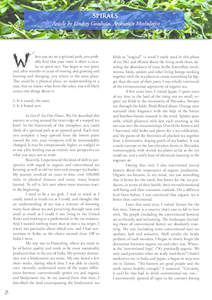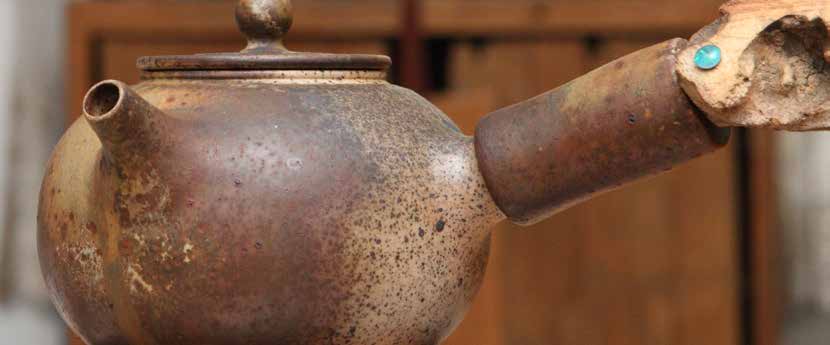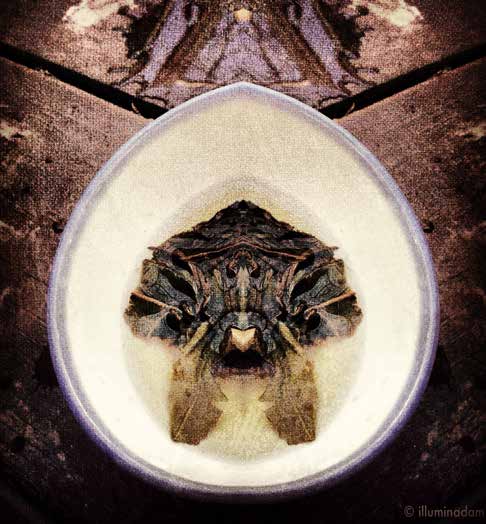
 |
|
When you are on a spiritual path, you probably find that your route is often a circular or spiral one. You begin at one point and, after months or years of moving and growing and learning and changing, you return to the same place: This could be a physical place, an understanding or a state, but no matter what form this takes, you will likely notice two things about it:
1. It is exactly the same. 2. It is brand new.
In Zen & Tea One Flavor, Wu De described this journey as a ring around the inner edge of a warped tea bowl. In the framework of this metaphor, you could think of a spiritual path as an upward spiral. Each time you complete a loop upward from the lowest point toward the rim, your viewpoint will be unmistakably changed. It may be conspicuously higher, or nudged in or out a bit, lending you an entirely new perspective on what you once saw as truth.
Recently, I experienced this kind of shift in perspective with regard to organic and conventional tea farming, as well as old tea trees and younger tea bushes. My journey involved six years in time, over 100,000 miles in physical distance and many, many lessons learned. To tell it, let's start where most journeys start: in the beginning.

I used to be a tea geek. I read as much as I could, tasted as much tea as I could, and thought that an understanding of tea was a mixture of knowing many facts about tea and perceiving through taste and smell as much as I could. I was living in the United States and working as a professional in the tea industry. And I wanted nothing more than to visit a tea origin. I wasn't too particular about which one, and I had connections in India, so the choice seemed clear. Off to India I went.
My trip was to Darjeeling, where tea tends to be of better quality and tends to be more sustainably produced than in the rest of India. My primary destination was a biodynamic tea estate. My stay lasted a few short weeks, during which time I was able to clearly, even viscerally, understand some of the major differences between conventionally grown tea and organic and biodynamic tea. In my journal from that time, I described the land encompassing the biodynamic tea fields as "magical" (a word I rarely used in this phase of my life) and effused about the living earth there, detailing the abundance of trees, herbs, butterflies, earthworms, birds, spiders and other living beings working together with the tea plants to create something far bigger than the sum of their parts. I was wholly convinced of the environmental superiority of organic tea.
A few years later, I visited Japan. I spent most of my time in the land of the rising sun on small, organic tea fields in the mountains of Shizuoka. Streams ran through the fields. Birds flitted about. Orange trees scattered their fragrance with the help of the breeze and bamboo forests moaned in the wind. Spiders spun webs, which glistened with dew each morning as the sun rose over the mountaintops. One of the farmers and I harvested wild herbs and plants for a tea celebration, and the guests of the festivities all plucked tea together from a diminutive, sloping patch of tea bushes. It was a stark contrast to the low-elevation farms in Shizuoka: monocropped, with cloned tea plants as far as the eye could see, and a sickly haze of chemicals looming in the stagnant air.
During that visit, I also interviewed several farmers about the importance of organic production. Organic tea became, in my mind, not just something that is better for the earth, but better for the tea producers, in terms of their health, their mental/emotional well-being and their economic outlook. On a different level from before, I was convinced that organic tea is better than conventional.
Later that same year, I visited Taiwan for the first time. Taiwan is a country that's easy to fall in love with. The people (including the conventional farmers) are so friendly and welcoming. The landscapes (including those of conventional farms) are absolutely stunning. The teas (including some conventional teas) are opulent, lush and seductive. Aloft amidst the heady perfume of such wonders, I began to slowly forget the distinction between organic tea and other teas. Whereas the 'conventional logic' ("It's practically organic. We only used pesticides when we really need them!") hadn't worked on me in India and Japan, it began to seep into me in Taiwan. "The farmers are good people and the earth seems healthy enough," I reasoned. "Certainly, it can't be that bad to drink conventional tea, too..." I conveniently ignored all signs to the contrary during that first voyage to Taiwan, as well as the following year leading up to my return to Taiwan.

Fortunately, my second trip to Taiwan was a longer one. By that time, I was living as a sort of international tea nomad, traveling to various tea origins and tea cultures and eking out a living by writing articles about what I learned. (Yes, I was still a tea geek.) Just beyond the beauty of Taiwan's landscapes and people, I began to see the darker side of this 'practically organic' production more clearly. It was the ideal preparation for my first visit to the Tea Sage Hut.
By the time I reached Wu De and his teachings of "organic tea only", I was finally ready to receive the message that had been called out to me for so many years, through so many experiences. There are myriad organic teas in the world. I am not losing anything by turning down the conventional teas and embracing the organic ones. What could I possibly gain by buying conventional teas? In buying conventional teas, wasn't I merely seeking a tea experience to add to my list of tea experiences? I've traveled that road already, and I now understand that it is simply an unending ego game of wanting more (and then more, and yet more still, ad infinitum until the grave). Yet, at the same time, I slowly began to understand that it was not about rejection of conventional farming as inherently "bad", either. I began to realize that it simply is, and the main thing that I can do is change my relationship to tea rather than try to change the nature of tea production itself (something I had tried a few times to do through tea journalism prior to that point).
For the following nine months, I went on a sort of tea fast as I traveled through Taiwan, India and Europe. Although I bought prepared tea, accepted gifts of tea and bought organic tea as gifts, I didn't purchase any tea leaves whatsoever for myself. I let teas come to me and opened myself to whatever was there before me. I was amazed by the teas that reached me in this way. There were beautiful organic teas that were gifted to me by dear friends, the handmade red tea that Wu De gave me along with my blue-rimmed tea bowl, and teas made with love and served to me at meditation courses, as well as countless teas that I would not have actively chosen to drink, but was grateful for nonetheless.
Then, shortly after I made Taiwan my new home last fall, I visited Mr. Xie, an organic farmer whom you may remember from our October mailing. He explained how his success with organic farming had encouraged others in his area of Nantou County to convert to organic production as well. The importance of financial energy flowing into new organic tea farms became very evident to me, and I was touched by this revelation.
Two weeks later, I made a purchase of tea for myself for the first time in nine months. But it was entirely different from any purchase of tea I've made before. The most noticeable difference was that the tea spoke to me in a way I had never felt before. On the day I bought it, I had no intention of buying tea, nor any desire to buy any. (After all, I live in a tea center. What more could I possibly want!) But something in that tea called out to me on a very deep level. I understood that it was not a purchase for me, but something larger. The tea was an organic tea from Ali Shan, Taiwan - a region where conventional tea production is causing some serious environmental repercussions, and where organic tea production is virtually nonexistent. The tea was from a farm under organic conversion, which means it wasn't entirely clean. And while these points may have counted against the tea in my mind in years past, this time it counted as a huge advantage. By then, I had accepted that conventional production exists, and had shifted my perspective to include choosing organic tea not because conventional tea is bad, but because organic tea is wonderful and because I want to support it wholeheartedly. It was the largest volume of tea I had ever bought for personal use.
But don't worry - I didn't gulp it all down greedily or force all our guests to drink it as a 'default tea' until it was all spent. Not coincidentally, the tea is a traditional roast oolong, which means it can age well. When this oolong spoke to me, it made its intentions clear: it wanted to be aged and, when it is ready to be drunk 20 years later, it will stand as an example of what kind of change is possible in the world. Since then, I've seen this tea speak to other guests, who have bought some for themselves and as a way to support organic production in Taiwan. It has been such a joy to watch this tea reach out and connect to others in a similar way to how it connected to me, and such a pleasure to sense that in 20 years, this tea will not be an outlier, but a forerunner, a messenger, a revolutionary. This, in part thanks to the economic support that I and many others have provided to this fledgling organic field in the midst of a sea of conventional ones.
And then, a few weeks ago, I took a trip around Nantou County, Taiwan, with someone who had grown up on an organic farm. Together, we explored a wide array of tea farms in the area (which is commonly referred to as "Tea County"). We investigated everything from old-growth tea trees and organic farms to chemicalsoaked swaths of cloned plants, seeing up close what was really happening to the land when it was treated with chemicals.
We began our trip with organic, old tea trees, feeling the life force in them and walking amongst them for an afternoon. Later, we saw organic farms, then farms which use chemicals on occasion. As our trip progressed, we headed to areas that have been less environmentally friendly. At one point, I even got sprayed in the face with pesticides as we passed one farm on a scooter, but after the initial shock wore off my concern was mainly for the worker who applies the chemicals for hours at a time, for the plants that were being sprayed and for the environmental fallout from such activities. At several points along the journey, we witnessed the aftermath of harsh chemical treatments, where several decades after chemicals were overused, the land is still being actively rehabbed to get it back to where it was before these transgressions against the land occurred.
Throughout the trip, my companion pointed out many of the things that were happening to the tea plants and the tea gardens on a deeper level, such as the infestation of a single, pesticide resistant type of insects and a detrimental mold (bad news for the plants and the farmers) or the presence of lots of spiders and varied undergrowth (good news for the plants and the farmers). And we both observed a clear difference in the feeling of the different types of tea gardens. For me, this feeling was a mix of the visible and the energetic. After looking closely across this spectrum of gardens and plant 'lifestyles' (if you will), I found that it became surprisingly easy to determine whether a plant was happy with its existence or not. And it wasn't a simple matter of how glossy its leaves were or how many new buds it lifted up to the sky. After all, these factors can be heavily influenced by the use of chemical fertilizers and the like, much like a person can appear healthy by taking toxic steroids for muscle tone or laying in a tanning bed for that 'healthy glow'. Instead, it was a sort of intuitive understanding, a communication with the plants akin to the signal the organic Ali Shan oolong sent me last autumn.

During this trip, I learned many lessons, but one stood out above the rest. It became crystal clear that organic tea is not merely 'better' than conventional tea. It is the tea that I love and the tea that I want to support, not just for myself, but for the earth and for my sisters and brothers on it. When it comes to buying tea to prepare for myself, give as a gift or serve to others, organic tea is the only tea that I am not just willing, but thrilled to support.
In many ways, this echoes my previous views on organic tea, but during this trip around the upward spiral of my tea path, my vantage shifted in one crucial aspect: It is not a judgment upon those who steep conventional teas, buy conventional teas or even produce conventional teas. It is a simple acceptance of what is, and a choice based on that acceptance.
As I said, I used to be a tea geek. I read as much as I could, tasted as much tea as I could, and thought that an understanding of tea was a mix of knowing many facts about tea and perceiving through taste and smell as much as much as I could. I was living in the United States and working as a professional in the tea industry. And I wanted nothing more than to visit a tea origin.
Now, I am a tea lover. I serve as much as I can, communicate as much with tea as I can and know that an understanding of tea is a mix of knowing many truths about tea and perceiving it through the senses, as well as a deep connection that goes beyond time and space. I am living in Taiwan, learning about the Leaf, and loving a life at origin. A loop closed, a spiral upwards, a journey continued...
